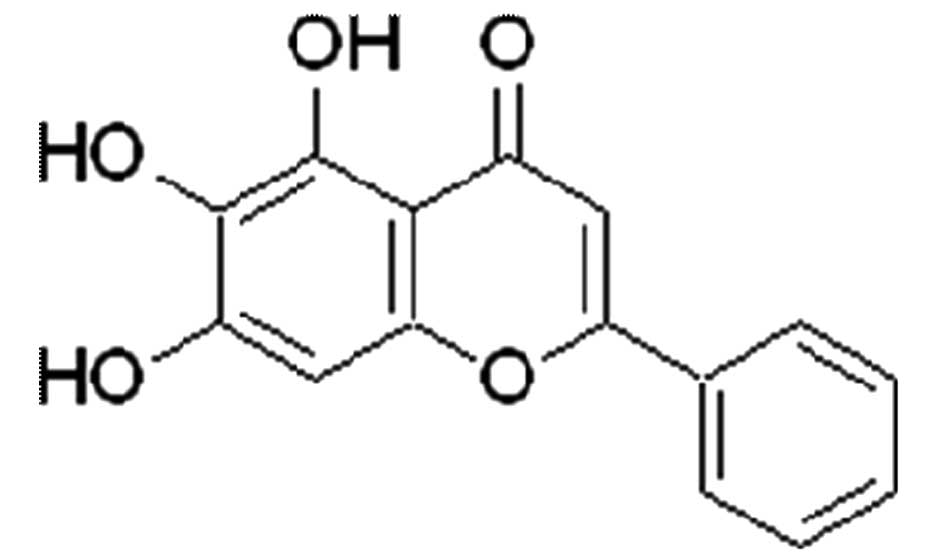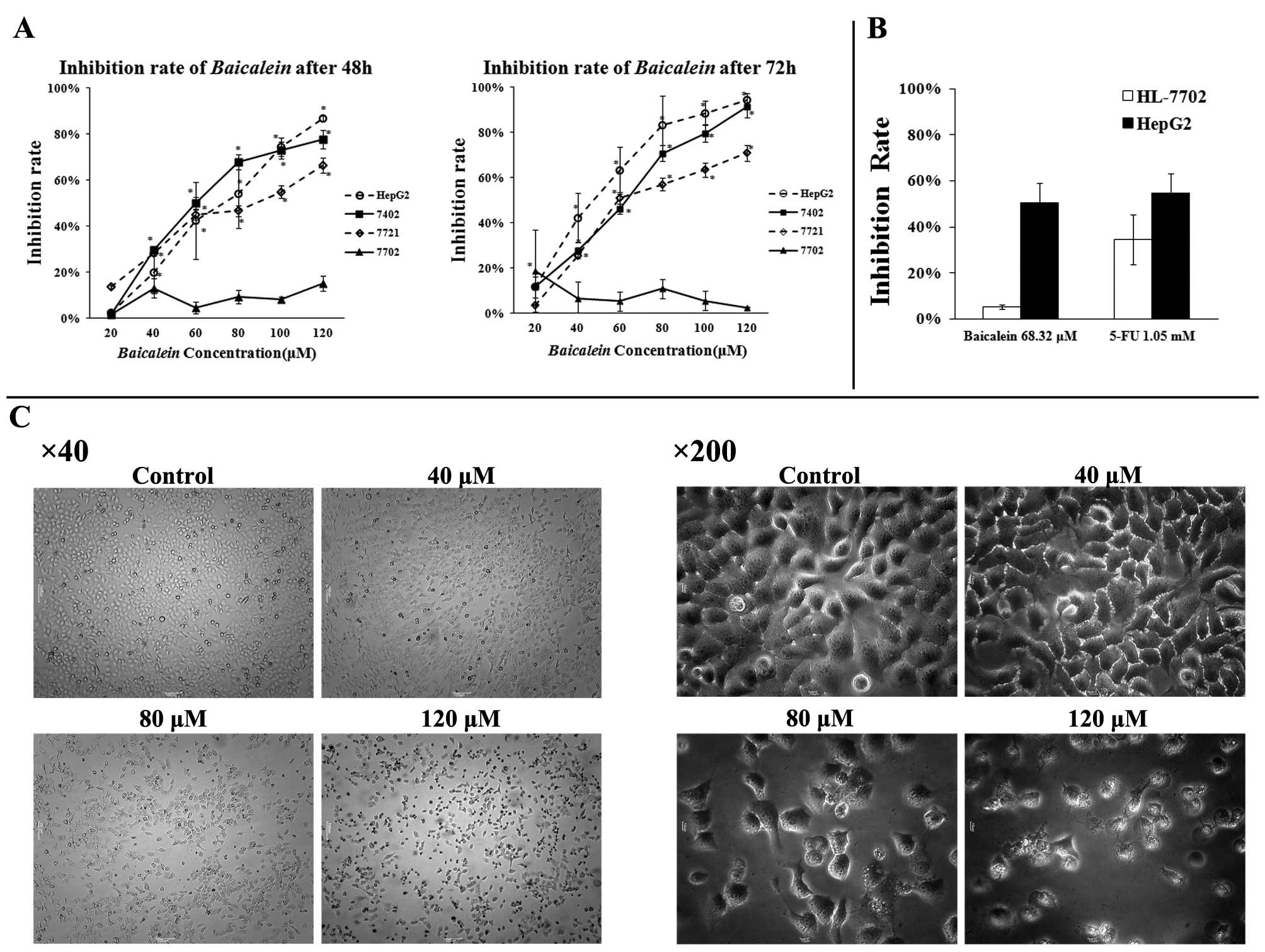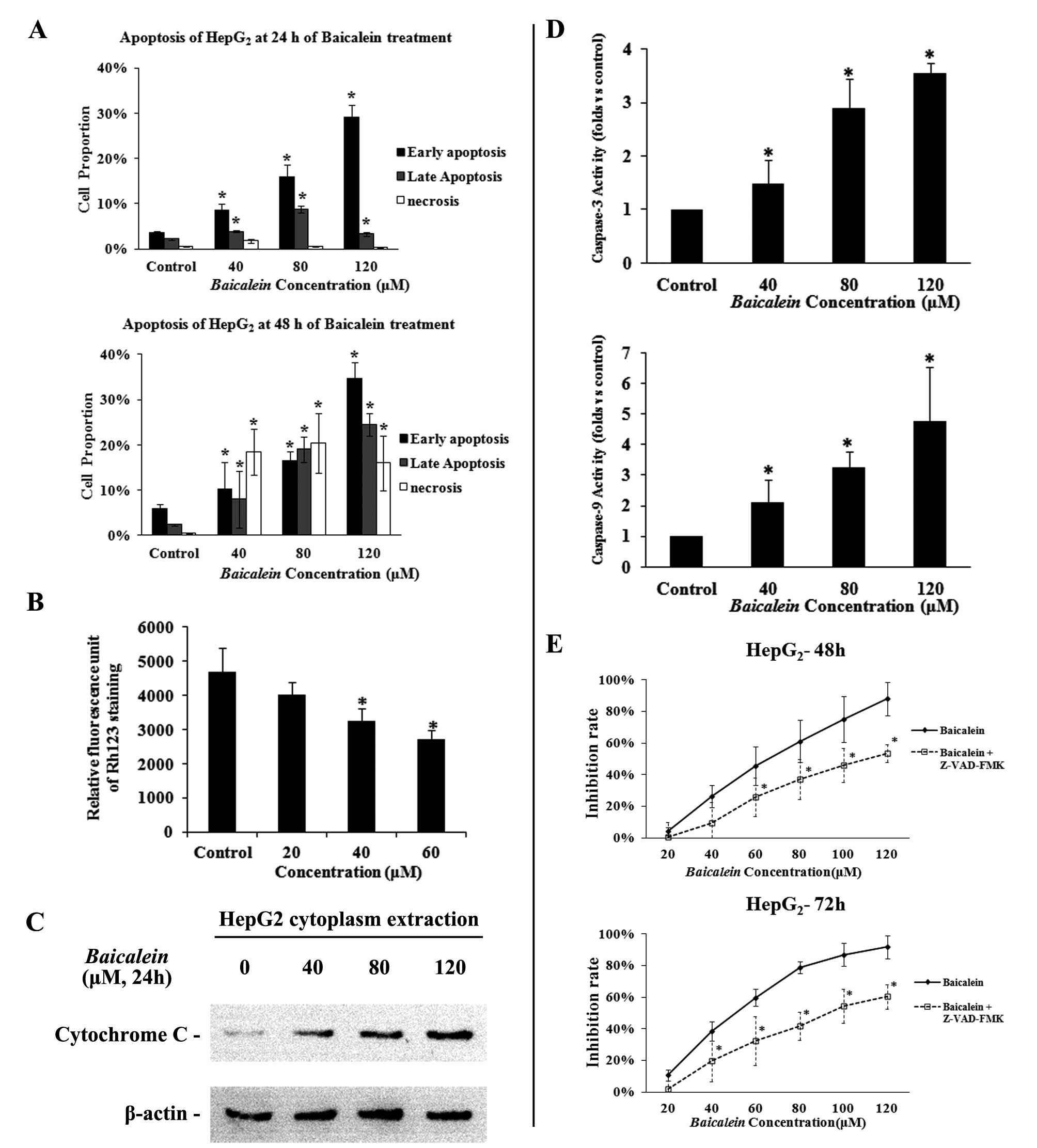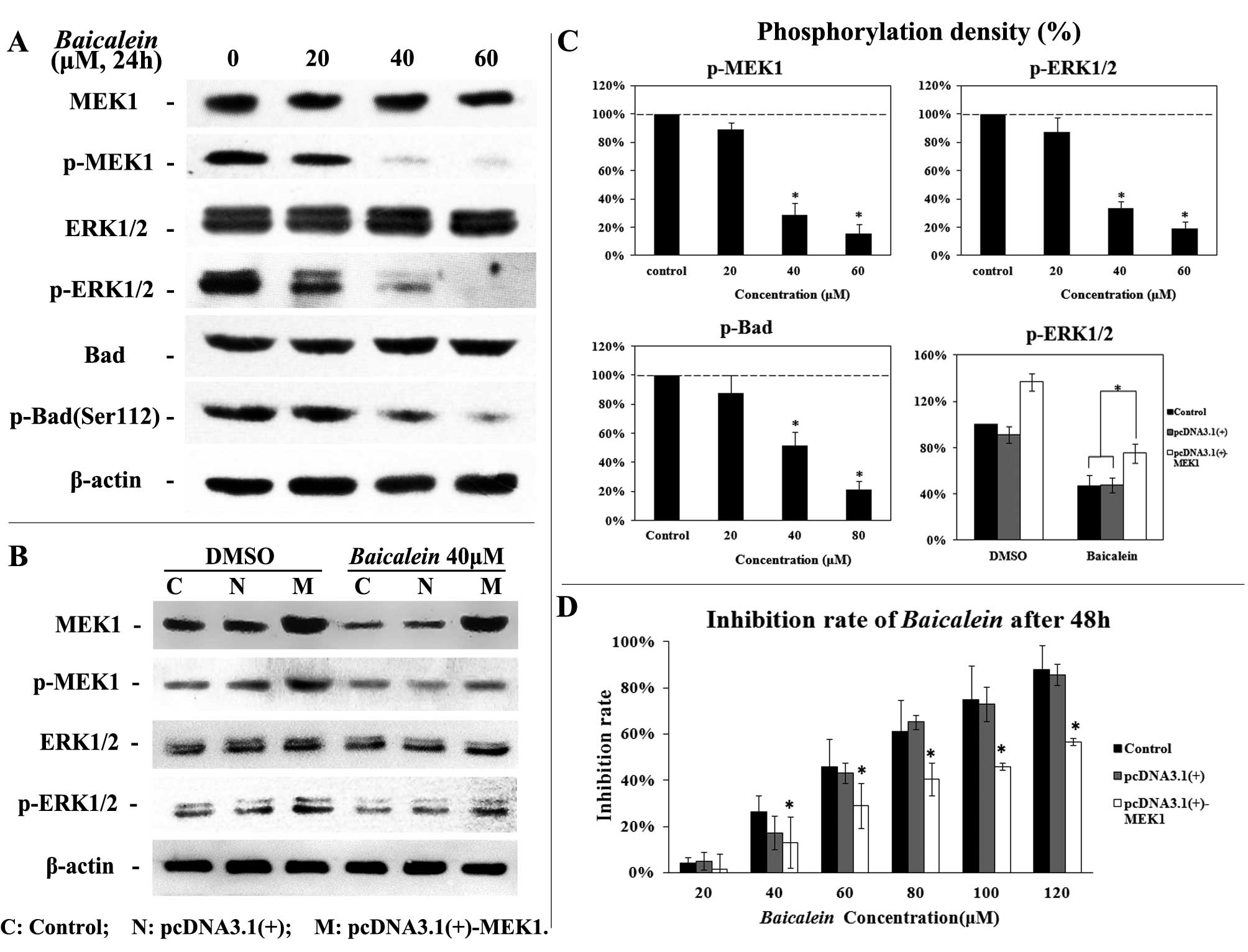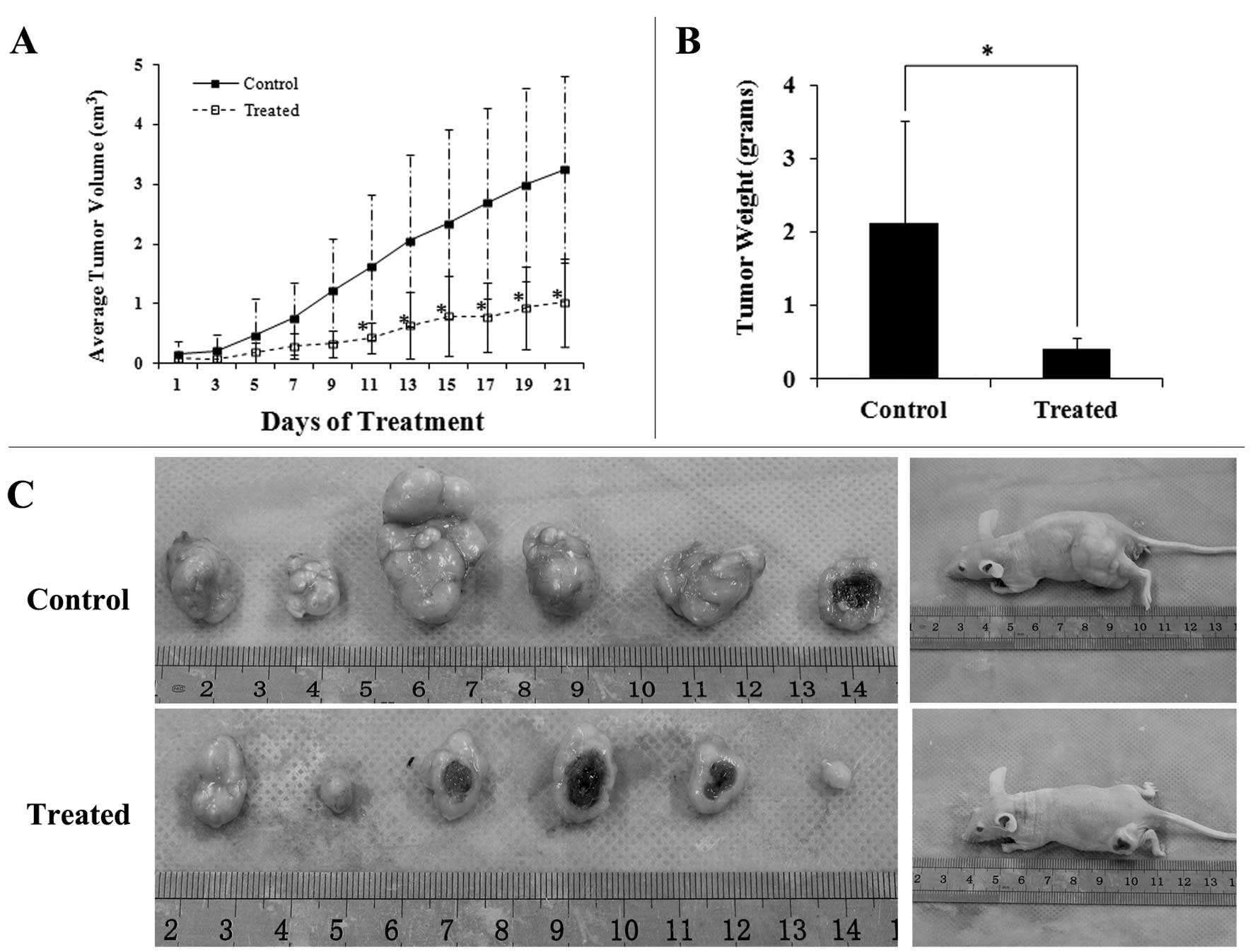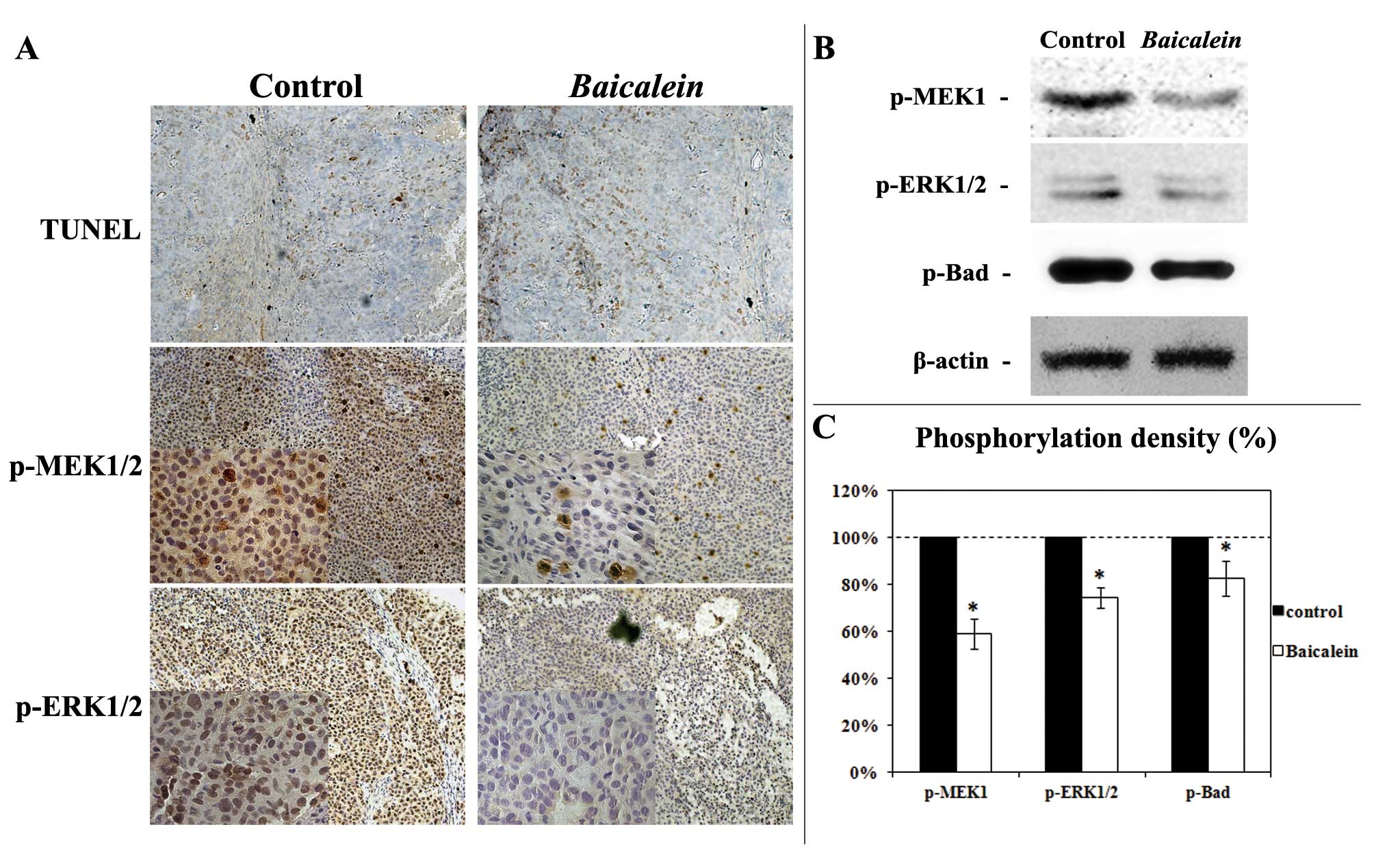|
1.
|
Siegel R, Ward E, Brawley O and Jemal A:
Cancer statistics, 2011: The impact of eliminating socioeconomic
and racial disparities on premature cancer deaths. CA Cancer J
Clin. 61:212–236. 2011. View Article : Google Scholar : PubMed/NCBI
|
|
2.
|
Zhang Y, Wang S, Li D, et al: A systems
biology-based classifier for hepatocellular carcinoma diagnosis.
PLoS One. 6:e224262011. View Article : Google Scholar : PubMed/NCBI
|
|
3.
|
Almogy G, Lieberman S, Gips M, et al:
Clinical outcomes of surgical resections for primary liver sarcoma
in adults: results from a single centre. Eur J Surg Oncol.
30:421–427. 2004. View Article : Google Scholar : PubMed/NCBI
|
|
4.
|
Livraghi T, Makisalo H and Line PD:
Treatment options in hepatocellular carcinoma today. Scand J Surg.
100:22–29. 2011.PubMed/NCBI
|
|
5.
|
Li ZF, Wang ZD, Ji YY, et al: Induction of
apoptosis and cell cycle arrest in human HCC MHCC97H cells with
Chrysanthemum indicum extract. World J Gastroenterol.
15:4538–4546. 2009. View Article : Google Scholar : PubMed/NCBI
|
|
6.
|
Wang ZD, Huang C, Li ZF, et al:
Chrysanthemum indicum ethanolic extract inhibits invasion of
hepatocellular carcinoma via regulation of MMP/TIMP balance as
therapeutic target. Oncol Rep. 23:413–421. 2010.
|
|
7.
|
Motoo Y and Sawabu N: Antitumor effects of
saikosaponins, baicalin and baicalein on human hepatoma cell lines.
Cancer Lett. 86:91–95. 1994. View Article : Google Scholar : PubMed/NCBI
|
|
8.
|
Matsuzaki Y, Kurokawa N, Terai S,
Matsumura Y, Kobayashi N and Okita K: Cell death induced by
baicalein in human hepatocellular carcinoma cell lines. Jpn J
Cancer Res. 87:170–177. 1996. View Article : Google Scholar : PubMed/NCBI
|
|
9.
|
Farazi PA and DePinho RA: Hepatocellular
carcinoma pathogenesis: from genes to environment. Nat Rev Cancer.
6:674–687. 2006. View Article : Google Scholar : PubMed/NCBI
|
|
10.
|
Gailhouste L, Ezan F, Bessard A, et al:
RNAi-mediated MEK1 knock-down prevents ERK1/2 activation and
abolishes human hepatocarcinoma growth in vitro and in vivo. Int J
Cancer. 126:1367–1377. 2010.PubMed/NCBI
|
|
11.
|
Scudiero DA, Shoemaker RH, Paull KD, et
al: Evaluation of a soluble tetrazolium formazan assay for
cell-growth and drug sensitivity in culture using human and other
tumor-cell lines. Cancer Res. 48:4827–4833. 1988.PubMed/NCBI
|
|
12.
|
Yang GY, Liao J, Kim K, Yurkow EJ and Yang
CS: Inhibition of growth and induction of apoptosis in human cancer
cell lines by tea polyphenols. Carcinogenesis. 19:611–616. 1998.
View Article : Google Scholar : PubMed/NCBI
|
|
13.
|
Tang W, Liu HW, Zhao WM, Wei DZ and Zhong
JJ: Ganoderic acid T from Ganoderma lucidum mycelia induces
mitochondria mediated apoptosis in lung cancer cells. Life Sci.
80:205–211. 2006.
|
|
14.
|
Li L, Lu QH, Shen YW and Hu X: Schisandrin
B enhances doxorubicin-induced apoptosis of cancer cells but not
normal cells. Biochem Pharmacol. 71:584–595. 2006. View Article : Google Scholar : PubMed/NCBI
|
|
15.
|
Li ZF, Jiang A, Zhang S, et al: miR-615-3p
promotes the phagocytic capacity of splenic macrophages by
targeting ligand-dependent nuclear receptor corepressor in
cirrhosis-related portal hypertension. Exp Biol Med (Maywood).
236:672–680. 2011. View Article : Google Scholar
|
|
16.
|
Brunnemann C, Weiger TM, Langeluddecke C,
et al: Ethanol depolarizes the membrane potential and changes the
cell volume of pituitary tumor cells (Gh3). Alcohol Clin Exp Res.
34:125a. 2010.
|
|
17.
|
Fang XJ, Yu SX, Eder A, et al: Regulation
of BAD phosphorylation at serine 112 by the Ras-mitogen-activated
protein kinase pathway. Oncogene. 18:6635–6640. 1999. View Article : Google Scholar : PubMed/NCBI
|
|
18.
|
Deak JC and Templeton DJ: Regulation of
the activity of MEK kinase 1 (MEKK1) by autophosphorylation within
the kinase activation domain. Biochem J. 322:185–192.
1997.PubMed/NCBI
|
|
19.
|
Ikemoto S, Sugimura K, Yoshida N, et al:
Antitumor effects of Scutellariae radix and its components
baicalein, baicalin, and wogonin on bladder cancer cell lines.
Urology. 55:951–955. 2000.
|
|
20.
|
Ye F, Wu J, Dunn T, Yi J, Tong XD and
Zhang D: Inhibition of cyclooxygenase-2 activity in head and neck
cancer cells by genistein. Cancer Lett. 211:39–46. 2004. View Article : Google Scholar : PubMed/NCBI
|
|
21.
|
Yu J, Liu H, Lei J, Tan W, Hu X and Zou G:
Antitumor activity of chloroform fraction of Scutellaria
barbata and its active constituents. Phytother Res. 21:817–822.
2007. View Article : Google Scholar
|
|
22.
|
Du GJ, Han G, Zhang S, et al: Baicalin
suppresses lung carcinoma and lung metastasis by SOD mimic and
HIF-1 alpha inhibition. Eur J Pharmacol. 630:121–130. 2010.
View Article : Google Scholar : PubMed/NCBI
|
|
23.
|
Chen CH, Huang LLH, Huang CC, Lin CC, Lee
Y and Lu FJ: Baicalein, a novel apoptotic agent for hepatoma cell
lines: a potential medicine for hepatoma. Nutr Cancer. 38:287–295.
2000. View Article : Google Scholar : PubMed/NCBI
|
|
24.
|
Han KH, Kim BK, Park JY, et al: Long-term
clinical outcomes of hepatic arterial infusion chemotherapy with
cisplatin with or without 5-fluorouracil in locally advanced
hepatocellular carcinoma. J Cancer Res Clin. 137:659–667. 2011.
View Article : Google Scholar : PubMed/NCBI
|
|
25.
|
Hoffman RM, Rashidi B, An ZL, et al:
Efficacy of intra-hepatectomy 5-FU on recurrence and metastasis of
human hepatocellular carcinoma in nude mice. Int J Cancer.
91:231–235. 2001. View Article : Google Scholar : PubMed/NCBI
|
|
26.
|
Bose Dasgupta S, Das BB, Sengupta S, et
al: The caspase-independent algorithm of programmed cell death in
Leishmania induced by baicalein: the role of LdEndoG, LdFEN-1 and
LdTatD as a DNA ‘degradesome’. Cell Death Differ. 15:1629–1640.
2008.PubMed/NCBI
|
|
27.
|
Elmore S: Apoptosis: a review of
programmed cell death. Toxicol Pathol. 35:495–516. 2007. View Article : Google Scholar : PubMed/NCBI
|
|
28.
|
Casares N, Pequignot MO, Tesniere A, et
al: Caspase-dependent immunogenicity of doxorubicin-induced tumor
cell death. J Exp Med. 202:1691–1701. 2005. View Article : Google Scholar : PubMed/NCBI
|
|
29.
|
Li HB, Jiang Y and Chen F: Separation
methods used for Scutellaria baicalensis active components.
J Chromatogr B Analyt Technol Biomed Life Sci. 812:277–290. 2004.
View Article : Google Scholar : PubMed/NCBI
|
|
30.
|
Ma Z, Otsuyama K, Liu SQ, et al:
Baicalein, a component of Scutellaria radix from
Huang-Lian-Jie-Du-Tang (HLJDT), leads to suppression of
proliferation and induction of apoptosis in human myeloma cells.
Blood. 105:3312–3318. 2005.PubMed/NCBI
|
|
31.
|
Ye F, Che YF, McMillen E, et al: The
effect of Scutellaria baicalensis on the signaling network
in hepatocellular carcinoma cells. Nutr Cancer. 61:530–537.
2009.
|
|
32.
|
Hui LJ, Min LH and He BK:
Mitogen-activated protein kinases in hepatocellular carcinoma
development. Semin Cancer Biol. 21:10–20. 2011. View Article : Google Scholar
|
|
33.
|
Lu SC, Yang HP, Magilnick N, Noureddin M
and Mato JM: Effect of hepatocyte growth factor on methionine
adenosyl-transferase genes and growth is cell density-dependent in
HepG2 cells. J Cell Physiol. 210:766–773. 2007.
View Article : Google Scholar : PubMed/NCBI
|
|
34.
|
Dong JH, Xie B, Xing RX, et al:
Down-regulation of c-Met expression inhibits human HCC cells growth
and invasion by RNA interference. J Surg Res. 162:231–238. 2010.
View Article : Google Scholar : PubMed/NCBI
|
|
35.
|
Tsukada Y, Miyazawa K and Kitamura N: High
intensity ERK signal mediates hepatocyte growth factor-induced
proliferation inhibition of the human hepatocellular carcinoma cell
line HepG2. J Biol Chem. 276:40968–40976. 2001.
View Article : Google Scholar
|
|
36.
|
Han JH, Tsukada Y, Hara E, Kitamura N and
Tanaka T: Hepatocyte growth factor induces redistribution of
p21(CIP1) and p27(KIP1) through ERK-dependent p16(INK4a)
up-regulation, leading to cell cycle arrest at G(1) in
HepG2 hepatoma cells. J Biol Chem. 280:31548–31556.
2005. View Article : Google Scholar : PubMed/NCBI
|
|
37.
|
O’Neil BH, Goff LW, Kauh JSW, et al: Phase
II study of the mitogen-activated protein kinase 1/2 inhibitor
selumetinib in patients with advanced hepatocellular carcinoma. J
Clin Oncol. 29:2350–2356. 2011.PubMed/NCBI
|
|
38.
|
Klein PJ, Schmidt CM, Wiesenauer CA, et
al: The effects of a novel MEK inhibitor PD184161 on MEK-ERK
signaling and growth in human liver cancer. Neoplasia. 8:1–8. 2006.
View Article : Google Scholar : PubMed/NCBI
|
|
39.
|
Kuo TC, Lu HP and Chao CCK: The tyrosine
kinase inhibitor sorafenib sensitizes hepatocellular carcinoma
cells to taxol by suppressing the HURP protein. Biochem Pharmacol.
82:184–194. 2011. View Article : Google Scholar : PubMed/NCBI
|
|
40.
|
Shen Y, Hsu C, Hsu C, et al: A phase II
study of sorafenib in combination with tegafur/uracil (UFT) for
Asian patients with advanced hepatocellular carcinoma (HCC). J Clin
Oncol. 27:45892009.
|
|
41.
|
Abou-Alfa GK, Schwartz L, Ricci S, et al:
Phase II study of sorafenib in patients with advanced
hepatocellular carcinoma. J Clin Oncol. 24:4293–4300. 2006.
View Article : Google Scholar : PubMed/NCBI
|
|
42.
|
Wang SH, Huang X, Li Y, et al: RN181
suppresses hepatocellular carcinoma growth by inhibition of the
ERK/MAPK pathway. Hepatology. 53:1932–1942. 2011. View Article : Google Scholar : PubMed/NCBI
|
|
43.
|
Takezawa K, Okamoto I, Yonesaka K, et al:
Sorafenib inhibits non-small cell lung cancer cell growth by
targeting B-RAF in KRAS wild-type cells and C-RAF in KRAS mutant
cells. Cancer Res. 69:6515–6521. 2009. View Article : Google Scholar : PubMed/NCBI
|
|
44.
|
Wilhelm SM, Adnane L, Newell P, Villanueva
A, Llovet JM and Lynch M: Preclinical overview of sorafenib, a
multikinase inhibitor that targets both Raf and VEGF and PDGF
receptor tyrosine kinase signaling. Mol Cancer Ther. 7:3129–3140.
2008. View Article : Google Scholar : PubMed/NCBI
|
|
45.
|
Zhang Z, Zhou XY, Shen HJ, Wang DX and
Wang YH: Phosphorylated ERK is a potential predictor of sensitivity
to sorafenib when treating hepatocellular carcinoma: evidence from
an in vitro study. BMC Med. 7:412009. View Article : Google Scholar : PubMed/NCBI
|
|
46.
|
Zha JP, Harada H, Yang E, Jockel J and
Korsmeyer SJ: Serine phosphorylation of death agonist BAD in
response to survival factor results in binding to 14-3-3 not
BGL-X(L). Cell. 87:619–628. 1996. View Article : Google Scholar : PubMed/NCBI
|
|
47.
|
Datta SR, Dudek H, Tao X, et al: Akt
phosphorylation of BAD couples survival signals to the
cell-intrinsic death machinery. Cell. 91:231–241. 1997. View Article : Google Scholar : PubMed/NCBI
|
|
48.
|
Bonni A, Brunet A, West AE, Datta SR,
Takasu MA and Greenberg ME: Cell survival promoted by the Ras-MAPK
signaling pathway by transcription-dependent and -independent
mechanisms. Science. 286:1358–1362. 1999. View Article : Google Scholar : PubMed/NCBI
|
|
49.
|
Scheid MP, Schubert KM and Duronio V:
Regulation of bad phosphorylation and association with Bcl-x(L) by
the MAPK/Erk kinase. J Biol Chem. 274:31108–31113. 1999. View Article : Google Scholar : PubMed/NCBI
|
|
50.
|
Xing HM, Zhang SS, Weinheimer C, Kovacs A
and Muslin AJ: 14-3-3 proteins block apoptosis and differentially
regulate MAPK cascades. EMBO J. 19:349–358. 2000. View Article : Google Scholar : PubMed/NCBI
|















